2003 Toyota Corolla Repair, Service & Tires
Get Started
Complete Auto Care for Your 2003 Toyota Corolla
-
TIRES FOR YOUR 2003 Toyota Corolla View Tire Info GET TIRE PRICING
-
REPAIR FOR YOUR 2003 Toyota Corolla View Repair Info SCHEDULE REPAIR
-
MAINTENANCE FOR YOUR 2003 Toyota Corolla View Maintenance Info SCHEDULE MAINTENANCE
-
OFFERS FOR YOUR 2003 Toyota Corolla Limited Time Tire Offers VIEW ALL COUPONS
2003 Toyota Corolla Tires
Recommended Tires | Tire Information
2003 Toyota Corolla Tires Sizes, Speed Ratings, and Inflation
Not sure about your 2003 Toyota Corolla tire size? Use the following chart to find information on tire size, speed rating, and inflation.
| Trim Level | Speed Rating | Inflation in PSI F/R | Tire Size |
|---|---|---|---|
| 2003 Toyota Corolla S | S | 30 PSI/30 PSI | P195/65R15 |
| 2003 Toyota Corolla LE | S | 30 PSI/30 PSI | P195/65R15 |
| 2003 Toyota Corolla CE | S | 30 PSI/30 PSI | P185/65R15 |
|
2003 Toyota Corolla S Speed Rating: S Inflation F/R: 30 PSI/30 PSI |
|
2003 Toyota Corolla LE Speed Rating: S Inflation F/R: 30 PSI/30 PSI |
|
2003 Toyota Corolla CE Speed Rating: S Inflation F/R: 30 PSI/30 PSI |
* Note: these models have different tire sizes depending on vehicle options.
Recommended Tires for Your 2003 Toyota Corolla
What tires are best for a 2003 Toyota Corolla? Check out the following tire brands and types.
 Blizzak WS90
Blizzak WS90
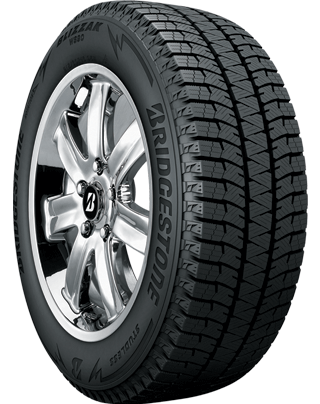
- No warranty
- Winter
- Winter
 Ecopia EP422 Plus
Ecopia EP422 Plus
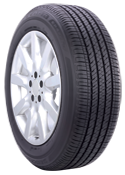
- Platinum Pact Limited Warranty
- All-Season
- Performance
 Turanza QUIETTRACK
Turanza QUIETTRACK
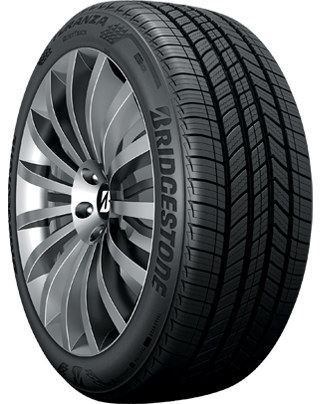
- No warranty
- All-Season
- Performance
 WEATHERPEAK
WEATHERPEAK
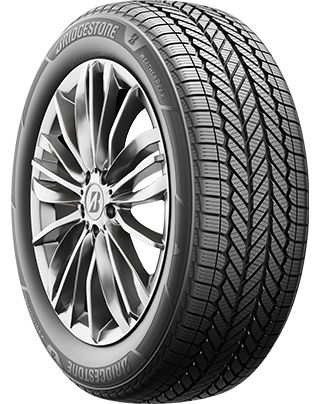
- Platinum Pact Limited Warranty
- All-Season
- Passenger Tires
 Ecopia EP422
Ecopia EP422
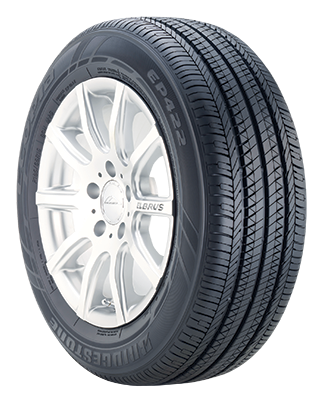
- Platinum Pact Limited Warranty
- All-Season
- Performance
 Affinity Touring S4 FF
Affinity Touring S4 FF
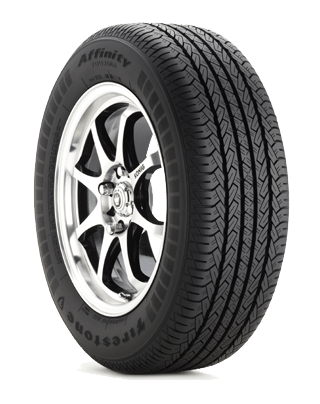
- Gold Pledge Limited Warranty
- All-Season
- Passenger Tires
 ALL SEASON
ALL SEASON

- No warranty
- All-Season
- Passenger Tires
 FT140
FT140
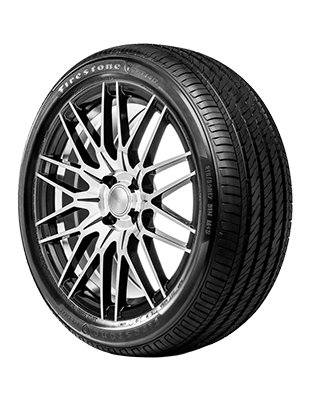
- No warranty
- All-Season
- Passenger Tires
 WEATHERGRIP
WEATHERGRIP
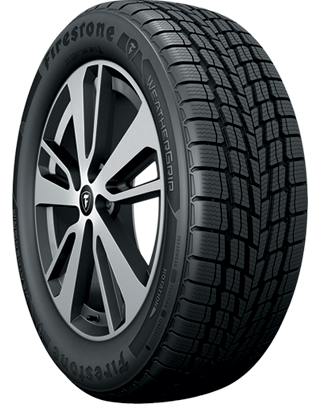
- No warranty
- All-Season
- Passenger Tires
 Winterforce 2
Winterforce 2
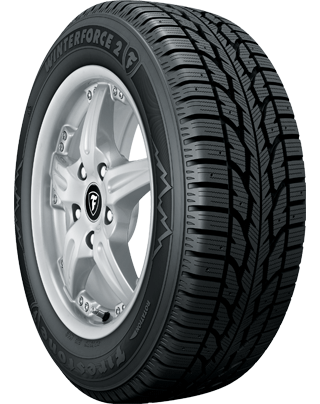
- No warranty
- Winter
- Winter

- No warranty
- All-Season
- Passenger Tires

- No warranty
- All-Season
- Passenger Tires
 Extensa A/S II
Extensa A/S II

- No warranty
- All-Season
- Passenger Tires
About 2003 Toyota Corolla Tires
Other than getting the proper tire size, you also want to think about a couple of other things when getting new Toyota Corolla tires like which tire brands you like most and where you drive. When evaluating your driving conditions, think about where you live (countryside vs. city vs. mountains) and the kind of unexpected weather you're likely to experience. Many drivers who live in states that experience all four seasons choose to purchase two sets of tires: one for summer and one for winter. Other drivers buy one set of all-season tires instead. That way they don't have to return to the tire shop and their vehicle is always ready for sun, rain, and light snow!
Next, consider your driving style. If you're a big off-roading fan who forges paths where others can't, you have very different needs than a long-distance commuter who sticks to the highway. Visit your local Firestone Complete Auto Care for help selecting the tire that's right for you, or get started by browsing tires that fit your Toyota Corolla.
Installing Toyota Corolla Tires
Firestone Complete Auto Care installs more tires on more cars than most other companies. We're a tire store that also offers professional tire installation, maintenance, and rotation, along with complete auto care. Buy 2003 Toyota Corolla tires online and schedule your installation when it's convenient for you.
2003 Toyota Corolla Tire Q&A
-
Is Toyota tire inflation important? The right tire pressure can make all the difference. Proper tire inflation helps increase fuel economy, improve braking time, and boost tire lifespan! Even a small change in tire pressure can impact your driving.
-
What do the numbers on my Toyota Corolla tires mean? Your tire sidewall numbers tell you the recommended load carrying capacity, speed rating, treadwear, traction, and tire size. Talk to a tire technician to learn how to read Toyota tire numbers.
-
Can I check the tread depth on my Toyota tires at home? Stay on top of your tire tread depth to help avoid a dangerous drive. You can check tread depth with a penny. Hold the penny so that Abraham Lincoln is facing you, then place your penny into a tread groove upside down. If you can see the top of Abe’s head, your tread is shallow and it might be time for new Toyota Corolla tires. Grab a penny. Hold the so that Abe Lincon's head is facing you and his hair is pointing toward the ground. Then, place the penny into a tread groove. If you can see the top of Abe’s head, your tread is shallow and it might be time for new Toyota Corolla tires.
Types of 2003 Toyota Corolla Repairs
Want more details? Choose a service below to read more about Toyota Corolla repairs at Firestone Complete Auto Care.
Get Repairs for Your 2003 Toyota Corolla
For most drivers, the words “car repair” don’t exactly spark excitement. We’re here to change that, though. At Firestone Complete Auto Care, we want to make car repair painless and hassle-free. Bring your 2003 Toyota Corolla in for repair services and our technicians will take care of your Corolla like it was their own. We’ll start by assessing what repairs may be needed, and we’ll provide you with a detailed explanation of what we recommend. We value your trust, so we recommend only the repairs we think are necessary for your safety on the road.
How Much Does Toyota Corolla Repair Cost?
Several factors can affect the cost to repair your 2003 Toyota Corolla, including the type of repair, costs of replacement parts or repair supplies, the amount of labor necessary to get the job done, and your locale. They're updated regularly!
A few different aspects can influence repair costs for your 2003 Toyota Corolla, like
2003 Toyota Corolla Auto Repair Q&A
-
Do I still need scheduled maintenance even when nothing is wrong with my Toyota? Don’t neglect scheduled maintenance. Sure, you could skip out on a few recommended maintenance services, but you may pay the price later. Bring your vehicle to Firestone Complete Auto Care at recommended service intervals to address minor issues before they get out of hand and keep your car running newer, longer.
-
Should I bring my Toyota in even if I can't pinpoint the problem? No, we’re not talking about finding the best jams on the radio! You know your car best, and you’re the first person who will notice if something doesn’t feel right (like new smells, sights, or sounds coming from your car). If you sense that something is 'off,' stop in for a Courtesy Check to have these symptoms checked out ASAP. Early action could help you prevent Toyota Corolla repairs.
-
Are the repairs you recommend for my Toyota actually needed? Talk to your technician. We'll never recommend a service or repair for your 2003 Toyota Corolla that we don't think is necessary for your safety.
2003 Toyota Corolla Brake Repair
Your Toyota Corolla may be powered by a strong engine. But if you can’t brake, it might as well be scrap metal. Don't wait if you're experiencing brake squeaks or a loss of braking power. Safe driving is difficult when your brakes are anything but their best. What's more, waiting for things to figure themselves out can result in more damage to your brakes and your wallet. Visit Firestone Complete Auto Care for the right brake repair for your 2003 Toyota Corolla. Our brake repair services include brake pad/shoe removal and replacement, brake rotor/drum resurfacing, brake fluid exchange, and wheel cylinder and brake caliper installation.
Toyota Corolla Brakes Questions
-
Why is my Corolla shaking as I brake? Feeling shaking or vibrating in your Corolla as you brake might indicate a few different problems, including worn brake pads or rotors, loose suspension components, damaged brake calipers, or warped rotors. Book an appointment for a free brake inspection as soon as you notice a problem with your brakes.
-
How long should my Corolla brake pads last? In general, brake pads can last from 30,000 to 40,000 miles. Certain factors, like driving on highways mostly and braking smoothly, can help your brake pads last longer. Hauling heavy loads and riding your brakes can shorten brake pad lifespan.
-
Can brake fluid leak when my Corolla is off? Your Corolla brake system is a closed hydraulic system, which means that the brake fluid should not leak out of the system under normal circumstances. However, over time, the various components of the brake system can wear out or become damaged, which can cause brake fluid to leak out of the system.
When to Get Toyota Corolla Drivetrain Repairs
Drivetrains for front, rear, and all-wheel-drive and 4WD vehicles are quite different, so you don't want to go to just anyone for drivetrain repair. You want to visit Firestone Complete Auto Care. We can take care of most 2003 Toyota Corolla drivetrain components Your Corolla might need driveshaft repair if you notice heavy vibrations in your floorboards, clunks when shifting, resistance when turning, or vibration as your vehicle accelerates.
2003 Toyota Corolla Drivetrain Q&A
-
What are the symptoms of a damaged Toyota drivetrain system? Noises toward the back of your Toyota Corolla, leaking fluid, trouble turning — these could all be signs of drivetrain damage you want to address. Take action before something more severe happens.
-
What triggers the malfunction indicator light (MIL) in a Corolla? Engine problems, transmission problems, faulty sensors, electrical issues, misfire issues, and connector problems could all cause your Corolla’s malfunction warning light, or better known as the check engine light, to illuminate.
-
How serious is a drivetrain malfunction in my Corolla? If your Corolla has a drivetrain malfunction, don't wait. Get it checked out by a professional mechanic. Identifying the underlying cause and performing the appropriate repairs right away can help prevent further damage and avoid unsafe driving conditions.
2003 Toyota Corolla Alignment Services
With an alignment service, adjustments are made to your Toyota Corolla’s suspension system, the connection between the vehicle and the wheels. During the service, the individual angles of your tires are adjusted so that they come into contact with the road in just the right way — the way Toyota intended them to. When you bring in your 2003 Toyota Corolla, we’ll perform an alignment check first. If needed, we'll adjust your wheel alignment angles to match Toyota recommendations.
Toyota Corolla Alignment Questions
-
What can knock my Toyota Corolla out of alignment? Hitting a pothole or curb can alter your wheel alignment. So can general wear and tear over time.
-
How frequently should you get a wheel alignment for your Corolla? Check your Corolla owner's manual for Toyota's recommended interval. It's generally a good idea to check your alignment every 6,000 miles or 6 months, depending on which comes first.
-
Does getting new Corolla tires mean you need an alignment? While you don’t necessarily need to get an alignment when putting new tires on your Corolla, it’s still a good idea. Ensuring your wheels are properly aligned can help support optimal handling, tire wear, and fuel efficiency.
Engine Repairs for Your 2003 Toyota Corolla
If your 2003 Toyota Corolla needs engine repair, our technicians will make sure you understand what’s going on before they start working on your engine. We don't start working until we have your approval. If a repair can wait, we'll let you know. We'll also tell you if it's necessary for your safety. We want to give you all the details you need to make an informed decision about your engine repairs. Choose Firestone Complete Auto Care for Toyota Corolla engine repairs and you can drive easy knowing that we use Toyota-approved parts and fluids — serpentine belt, valve guide seal, sensors, or a different component.
Engine Q&A 2003 Toyota Corolla
-
Why does the check engine light in my Corolla turn on when I start my car? It’s usually normal for your check engine light to turn on upon ignition. This is just your Corolla testing its circuits. The dash light shouldn't stay on. If it does, you might want to bring your vehicle in for service.
-
Are Toyota Corolla engine noises bad? Strange engine sounds can be a sign something’s off in your Toyota Corolla. Knocking or tapping could be a symptom of low oil. A high-pitched whistle could signal an intake leak or misaligned belt. Squealing can be traced back to a loose fan belt, and grinding might be a sign of brake problems rather than engine issues.
-
What could damage my Toyota Corolla engine? Certain driving habits can damage your engine and should be avoided. These habits include 'running on fumes,' revving the engine while still in Park, or pushing 'the pedal to the metal' before the engine has warmed up. Help sustain your engine’s performance and efficiency by staying miles away from these bad driving practices.
Tire Repair for Your 2003 Toyota Corolla
If the road has been rough on your 2003 Toyota Corolla tires, Firestone Complete Auto Care can help. There’s a chance your tire could be plugged and patched (rather than replaced). Our technicians can inspect your tire and let you know if it is safe to repair. To start, we’ll consider the location of tire damage, the type of issue, the size and scope of the damage, and the amount of wear on your tires.
If your 2003 Toyota Corolla tire puncture can be repaired, we'll follow three basic steps to repair it: (1) Take the tire off the wheel for easy inspection, (2) fill the puncture to keep the moisture out, and (3) seal the inner liner with a repair unit to prevent air loss.
Your Questions About Toyota Corolla Tire Repair, Answered
-
How soon should I have my flat tire repaired? Driving on a flat tire is not a good idea. Your Corolla engine will keep running with a flat tire, but you could damage your wheel by continuing to drive on a flat.
-
Is temporary sealant bad for my Toyota's tires? Temporary sealants will solve your problem… for a little bit. If you’ve seen temporary or emergency tire sealant before (it usually comes in a can), it can be tempting to turn to this as a solution for your flat tire. Keep in mind that these fixes could buy you some time to get to Firestone Complete Auto Care for a proper repair, but they could also cause some harm in the process (for example, damage to your TPMS). Plus, using a product like this could void your tire warranty.
-
Why do my Corolla tires keep losing air? Possible reasons for your Corolla tires continuously losing air include a leaking valve steam, wheel damage, and a puncture or hole in the rubber.
Maintenance for Your 2003 Toyota Corolla
When it comes to your Toyota Corolla, how you treat your car makes all the difference in its performance. With proactive maintenance, your Corolla could be on the road well past the 200,000 mile mark.
2003 Toyota Corolla Maintenance Information
There's no need to guess when it's time to get Corolla maintenance, and no need to wait until something goes wrong. It’s as easy as following the recommended maintenance schedule that’s been written specifically for your 2003 Toyota Corolla! Toyota knows your vehicle inside and out (they made it, after all!), so they’ve designed this schedule with your car’s unique needs in mind. Driving conditions, climate variations, and other variables can affect which scheduled maintenance services you’ll need; however, there’s a good chance that your vehicle’s recommended maintenance services will include oil changes, tire rotations, brake pad replacement, filter changes, and fluid checks and exchanges. Keeping up with routine service appointments is a great way to keep your Corolla running for longer, increase your vehicle safety, and help you avoid expensive repairs caused by 2003 Toyota Corolla problems later.
Essential Maintenance to Keep Your 2003 Toyota Corolla Running Newer, Longer
Come to Firestone Complete Auto Care for manufacturer-recommended routine maintenance on your 2003 Toyota Corolla and our technicians will jump right in with a Courtesy Check. This Courtesy Check can establish a baseline of what may need to be addressed during your service appointment. Every Courtesy Check will include a visual inspection of your Corolla. We’ll check your head and tail lights, fluid levels, filters, tires (and their alignment!), and windshield wiper blades. We’ll also perform a free battery check to determine your battery’s charge level.
Firestone Complete Auto Care is your one-stop shop for 2003 Toyota Corolla maintenance and repairs. We can help you keep your vehicle (and your life!) running smoothly. Many of our locations have weekend and evening hours for your convenience.
2003 Toyota Corolla Maintenance Questions
-
What do I do if I hit a pothole in my Toyota Corolla? Watch out for pothole damage. If your 2003 Corolla is pulling to one side or the other, your tires or suspension system could be calling out for help.
-
When should I use high mileage oil in my Toyota Corolla? If your Toyota Corolla has ticked past 75,000 miles, consider switching to high mileage oil at your next oil change to give your engine what it needs to go another 75,000 (or more!). High mileage oil: make it a high priority!
-
Why are my Toyota dashboard lights on? Because there might be a problem under the hood. Those warning lights are there for a reason! As soon as you notice that one’s illuminated, take your Toyota Corolla to Firestone Complete Auto Care so you can address any small problems long before they worsen.
The Right Battery Size for a 2003 Toyota Corolla
Not sure what battery to get for your Toyota Corolla?
| Battery | Engine | Warranty | Cold Cranking Amps | |
|---|---|---|---|---|
| 35-1 | L4/1.8L | Replacement 24 months | Performance months | 500 |
| 35-2 | L4/1.8L | Replacement 36 months | Performance months | 640 |
| 35-AGM | L4/1.8L | Replacement 36 months | Performance months | 650 |
Car Batteries for 2003 Toyota Corolla
On average, auto batteries last anywhere from three to five years. Don’t get stranded by your Corolla’s car battery. Replace it regularly instead! Pay attention to clues that your battery is on its way out. A slow engine crank, a blinking battery or check engine light, swollen battery case, corroded battery posts, or dim headlights can all signal that your battery is on its last leg.
Plus, at Firestone Complete Auto Care, we’ll test your battery for free. Stop by for a free battery test and, if needed, get your Toyota Corolla a replacement battery. Car batteries are only one of our many strong suits. Our expert technicians understand Toyota service recommendations for Corolla battery cold cranking amps and reserve capacity. Get help figuring out the battery size that's best for your Corolla, and schedule a weekday or weekend battery replacement service for your car.
Top Toyota CorollaCar Battery Questions
-
Why won't my Toyota Corolla battery stay charged? A battery is in its final hour when it will no longer hold a charge. The battery may be too old. Or, you may have been leaving your car doors ajar and the cabin light at night. Stop by for a complimentary battery check at your favorite Firestone Complete Auto Care and get a handle on your car battery’s health.
-
How long do car batteries last? The typical 12-volt car battery may last three to five years, depending on the type of battery, the driving conditions, and how well the battery is maintained.
-
Why is there white, crusty buildup on my Corolla’s battery post? If you notice white, crusty stuff around the battery terminals of your Corolla, it's likely corrosion. A chemical reaction between battery acid and the air can create a white, powdery substance that builds up over time on the terminals. This buildup can interfere with the electrical connection between the battery and your Corolla’s electrical system, potentially leading to poor performance, difficulty starting, and other issues.
Oil Changes for 2003 Toyota Corolla
Toyota recommends having your 2003 Toyota Corolla’s motor oil changed at regular intervals. Outside of Toyota-recommended oil change intervals, your Corolla may need an oil change if your check engine light is on, you hear engine knocking, smell oil inside the vehicle, or notice excess vehicle exhaust. You may also need an oil change more frequently than Toyota recommends if you haul heavy loads, frequent dusty roads, adventure off-road, or go long distances at low speeds.
Whether it’s synthetic, conventional, or a blend of both — your local Firestone Complete Auto Care has the right oil for your Toyota Corolla. Check your owner's manual and talk with a technician to select the right Toyota Corolla oil, whether it's Quaker State® Advanced Durability™ conventional oil, Pennzoil® High Mileage Vehicle® motor oil, Pennzoil Platinum® Full Synthetic motor oil with PurePlus™ Technology, or Shell Rotella® heavy-duty engine oil. During an oil change, an auto technician will change your Corolla’s oil, replace and recycle your used oil and filter, inspect all of your other filters, refill vital car fluids, and perform a courtesy inspection on your entire vehicle. Get professional engine care by making an oil change appointment for your Corolla today.
Oil Change Q&A for Your 2003 Toyota Corolla
-
What can cause the oil light on my Toyota Corolla to illuminate? If you’re overdue for an oil change, it might trigger your Toyota Corolla oil change reminder light. If the oil pressure light is illuminated, it could be due to low engine oil, a failing oil pump, a malfunctioning oil pressure sensor, or a clogged oil filter.
-
Can I change my Toyota oil on my own? First off, changing your own oil isn’t as easy as you’d think. You’ll have to buy special tools and figure out a way to recycle the old oil properly. Getting a professional oil change reduces the risk of something going wrong during the service, but also helps your car perform down the road.
-
Why is my Toyota Corolla spewing blue or gray exhaust smoke? You could have an oil leak and have a case of burning oil. Looks like it’s time for a professional to take a look. The leak could be the result of worn valve seals, fried piston rings, or old cylinder walls.
2003 Toyota Corolla Tune-Up & Engine Service
Routine engine tune-ups can bring power back to your Corolla. The Firestone Complete Auto Care location in your community offers several Toyota Corolla engine tune-up services. The standard Firestone Tune-Up is one service option. The standard Firestone Tune-Up includes new spark plugs (and installation!), a thorough inspection of engine components, and a lifetime parts warranty*. Another service option pays special attention to the filters in your Corolla. Specifically, we replace the fuel filter and air filter. The third tune-up option is a fuel system cleaning service, which is a three-step process that removes varnish, dirt, and carbon deposits on your Corolla's fuel injectors, throttle body, and throttle plate. The result? Restored fuel system performance. Here’s something to remember when choosing services: the mileage and service history of your Corolla can determine what kind of service it needs. Chat with a Firestone technician before you jump into a specific service to ensure your engine tune-up money is well-spent.
*Check with a teammate at Firestone Complete Auto Care for complete terms and conditions regarding warranties.
2003 Toyota Corolla Engine Tune-Up Q&A
-
When should Toyota Corolla spark plugs be replaced? When it’s time to replace the spark plugs, don’t delay. These small (but vital!) parts provide the electric spark that your car needs in order to start, and old spark plugs can prevent your car from starting at all. Replace spark plugs on time or about every 30,000 miles or so.
-
What do I do if I see a pool of liquid under my Toyota Corolla? Puddles could indicate an oil leak, coolant leak, or brake fluid leak– all of which can critically hurt your engine. Have your engine inspected as soon as you spot a pool of liquid in your usual parking spot.
-
How often should I clean my Toyota Corolla fuel injectors? The cleaning schedule for vehicle fuel injectors varies depending on your driving conditions and the type of fuel you use. Some manufacturers suggest cleaning your fuel system as part of routine maintenance, while others will recommend it on an as-needed basis if you’re experiencing poor performance. Reference your Toyota owner’s manual for exact guidelines.
Suspension Service & Repair for 2003 Toyota Corolla
During the first few years you had your 2003 Toyota Corolla, you and your passengers probably enjoyed a ride that was smooth and balanced. Now, however, things are starting to feel a little rough. Maybe your Corolla jolts, pulls to one side, or makes noise whenever you turn or drive over a speed bump. The first sign of trouble is the best time to bring your 2003 Toyota Corolla in for steering and suspension repairs. We'll get to the root of the problem and, if your Corolla suspension system needs repair, we’ll explain what your car needs and how much it’ll cost to get it done. We won't begin any work without your permission.
2003 Toyota Corolla Steering & Suspension Questions
-
What can cause my Toyota Corolla to have a bouncy ride? If it feels like you’re on a trampoline every time your Corolla goes over a bump or dip, you may have a problem with your struts or shocks. Faulty shocks and struts can’t properly absorb road bumps, leading to a bouncy ride.
-
Why does my Corolla tilt forward when I hit the brakes? As you brake, the forward momentum of your Corolla combined with its weight sends a ton of force to its front end. A damaged or worn suspension system can cause the front end to compress and dip even further.
-
What role do tire pressure and tread depth play in my Toyota's suspension? Keeping your tires properly inflated can help reduce strain on the suspension, and also help you notice when you need new tires. A tire that doesn't have an adequate amount of tread can't grip the road or function as well as the manufacturer intended.
Convenient & Local 2003 Toyota Corolla A/C Service
Technicians at Firestone Complete Auto Care are ready to help you address your 2003 Toyota Corolla A/C problems. During an A/C performance check, we'll determine the condition of your 2003 Toyota Corolla A/C system to determine whether repair work is needed. This check will include an examination of system pressure, a visual inspection, and a leak test.
While your 2003 Toyota Corolla’s air conditioner is being serviced, we’ll also do an A/C evacuation and recharge. During this process, a technician will remove the old refrigerant from the A/C system. Then, they’ll perform an evacuation (also known as a discharge) on the entire system per Toyota guidelines. To finish, we’ll add new refrigerant to recharge the A/C system.
Frequently Asked Questions for 2003 Toyota Corolla A/C Systems
-
Why is my Corolla A/C blowing hot air? If your car’s air conditioning isn’t blowing cold air at all (or it tries, then turns warm), you could have a clogged expansion valve, a faulty compressor clutch, a leak, or a malfunctioning fuse in the system.
-
What causes A/C system leaks? A/C system leaks are often due to a combination of age and moisture. Rubber seals and gaskets naturally degrade over time, allowing refrigerant to exit and moisture to enter your Corolla's A/C system.
-
Why does my vehicle have to be moving for my Corolla’s A/C to work? If your A/C only works when the vehicle is moving, there could be a problem with part of your Corolla’s A/C or electrical system. Potential issues include low coolant or a faulty cooling fan.
2003 Toyota Corolla Transmission Service
The transmission delivers power from the motor to your wheels so that you can drive at your desired speed. Because of the transmission’s responsibility to translate the right dose of power into the right amount of speed, a small transmission issue can put a big dent in your Corolla’s performance. Toyota Corolla transmission problems can present themselves as shifting delays, grinding or jumping during acceleration, the car shaking at any speed, or a burning smell or whistling sounds coming from under the hood. If you ignore Toyota Corolla transmission issues you might notice your fuel economy decrease or find that your Corolla isn’t working at all. Our expert techs are familiar with 2003 Corolla services and perform them according to Toyota-recommended specifications. Schedule an appointment at your local Firestone Complete Auto Care at the first sign of transmission problems to help keep your engine running at peak performance.
Questions About 2003 Toyota Corolla’s Transmission
-
Does my Corolla's transmission fluid need to be inspected? Maintaining your Toyota Corolla transmission fluid is one of the best ways to maintain your transmission's health. A general rule of thumb is to have your transmission fluid checked and changed about every 30,000 to 60,000 miles, but that timeline can change if you're hard on your Toyota. Leaks or low transmission fluid are easy to spot and affordable to repair.
-
Can my Toyota Corolla leak transmission fluid? Over time, transmission fluid can leak from your Toyota Corolla, potentially causing transmission problems. A transmission fluid leak may be caused by a damaged transmission pan, faulty transmission cooler lines, worn-out seals, a cracked transmission housing, or an overfilled transmission.
-
Can I drive my Toyota Corolla with a transmission fluid leak? You should avoid driving with a transmission fluid leak. Your transmission system relies on transmission fluid to operate properly, and a leak may decrease performance, cause your Corolla to overheat, or even lead to transmission failure.
Vehicle Inspection for 2003 Toyota Corolla
When you bring your vehicle to Firestone Complete Auto Care for any service, we’ll automatically do a multi-point Courtesy Check. First, a technician will pop the hood on your Toyota Corolla and test the battery to determine how much charge remains. The check will continue with a visual inspection of your Toyota Corolla's filters, lights, wiper blades, alignment, tires, hoses, belts and fluid levels.
Every service performed at your nearest Firestone Complete Auto Care will include a Courtesy Check, but you can also request a Complete Vehicle Inspection for your 2003 Toyota Corolla if you suspect there may be a bigger problem. In addition to a visual check of everything that's included in a Courtesy Check, a Complete Vehicle Inspection also includes a thorough manual inspection of your steering and suspension system, brakes, and exhaust components. With this inspection, we want to help you stay on top of any issues that may need immediate attention in order to prevent further damage.
Depending on your location, you may be able to take care of your state inspection or safety test at your local Firestone Complete Auto Care. Specific requirements for these types of inspections vary by state.
Common 2003 Toyota Corolla Vehicle Inspection Questions
-
When does my Toyota Corolla need an inspection? It needs a check-up if something feels 'off' to you, the driver. Your Toyota Corolla could benefit from a Courtesy Check if it has any illuminated dashboard lights, you hear weird noises coming from any part, the engine doesn't start sometimes, or your vehicle pulls to one side.
-
My 2003 Toyota Corolla failed the state inspection test. Can you fix it? Did your vehicle fail a recent state inspection test? We can help. Come in for a checkup and we’ll diagnose the issue.
-
When should I get a complete vehicle inspection for my Toyota Corolla? The best time to get a complete vehicle inspection for your Toyota Corolla is before going on a road trip for the peace of mind. Another great time is when something abnormal occurs, and you can't pinpoint the issue. You might notice new dashboard lights, hear strange noises from under the hood, or your steering wheel doesn't feel like it once did.
2003 Toyota Corolla Radiator Repair & Service
Staying on top of routine radiator maintenance for your 2003 Toyota Corolla is crucial to keep your engine in the best possible shape for years to come. To keep your radiator functioning, Toyota recommends replacing your antifreeze or coolant at scheduled intervals but you can also take note of any signs your radiator is going bad. You might be driving around (or about to be stranded) with a failing radiator if you notice a low coolant light or higher-than-normal engine temperatures on your dashboard, or if you spot coolant leaks coming from your car.
If you bring your vehicle to Firestone Complete Auto Care, we start with a comprehensive inspection of your Toyota Corolla’s cooling system. Then, we’ll move on to a machine-powered coolant exchange. Finally, we’ll refill the flushed sealants, lubricants and chemicals, then do a pressure check to catch any possible leaks. From the heater core to the radiator cap, we’ll take excellent care of your 2003 Toyota Corolla at Firestone Complete Auto Care.
Common Toyota Corolla Radiator Questions
-
What does the coolant light on my Toyota dashboard mean? f the coolant light illuminates on your dashboard, your engine could be overheating. Pull over to a safe area and wait for the engine to cool down. Then, head to your nearest Firestone Complete Auto Care for a coolant system check.
-
My Corolla overheated! What can cause that? Low coolant, a damaged cooling fan, a faulty water pump, a malfunctioning thermostat, or a clogged radiator could all cause your Toyota Corolla engine to overheat.
-
Why does the radiator in my Corolla sound like it’s rumbling or boiling? Air pockets in your Corolla’s cooling system may cause a rumbling or boiling noise. You could also have a clogged radiator or simply need to replace the radiator cap.